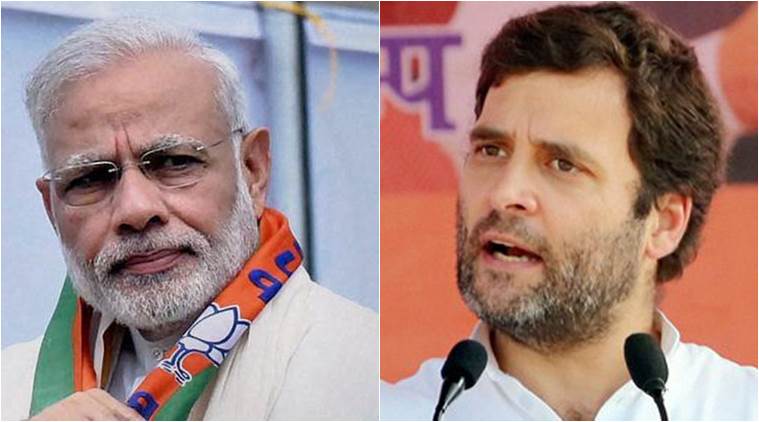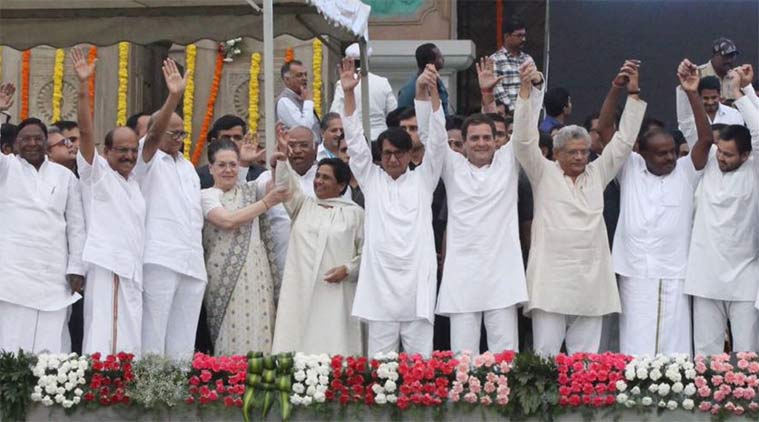Stay updated with the latest - Click here to follow us on Instagram
How are the 2019 Lok Sabha elections shaping up: All your questions answered
While recent opinion surveys have revealed that Modi remains highly popular after four years in office, BJP has managed to come to power in 21 states, while expanding its footprint in the northeast.
 The coming together of all the regional satraps and a resurgent Rahul Gandhi will no doubt mount a formidable challenge to the BJP in the 2019 elections. (File)
The coming together of all the regional satraps and a resurgent Rahul Gandhi will no doubt mount a formidable challenge to the BJP in the 2019 elections. (File)
With 11 months still to go for the 2019 Lok Sabha elections, political pundits have already billed it as a contest between Prime Minister Narendra Modi vs the entire Opposition. While recent opinion surveys have showed that Modi remains highly popular after four years in office, the BJP has managed to come to power in 21 states, while expanding its footprint in the northeast. When it got the decisive mandate in 2014, the saffron party had just eight states in its kitty.
Even in its defeat in the Karnataka assembly elections, where it failed to form the government despite being the single largest party, the BJP has ‘found the positives’ — they have argued that it was Modi’s “undiminished popularity” that had rattled even “enemies” to come together. However, the coming together of all the regional satraps and a resurgent Rahul Gandhi will no doubt mount a formidable challenge to the BJP in the 2019 elections.
When will the 2019 Lok Sabha elections be held? When is the tenure of the present government ending?
The 2019 Lok Sabha elections will be held sometime around April and May. The tenure of the Narendra Modi-led NDA government will end on May 26, 2019. The 2014 general elections were held in nine phases from April 7 to May 12 in 2014. In the last Lok Sabha elections, the NDA won an impressive 336 seats, with the BJP crossing the halfway mark on its own by winning 282 seats.
 Opposition leaders, including Congress’ Sonia Gandhi and Rahul Gandhi, SP’s Akhilesh Yadav, AP CM Chandrababu Naidu, WB CM Mamata Banerjee, RJD’s Tejashwi Yadav, CPI(M)’s Sitaram Yechury, NCP’s Sharad Pawar, BSP’s Mayawati and newly sworn-in Karnataka CM HD Kumaraswamy at Vidhana Soudha. (File)
Opposition leaders, including Congress’ Sonia Gandhi and Rahul Gandhi, SP’s Akhilesh Yadav, AP CM Chandrababu Naidu, WB CM Mamata Banerjee, RJD’s Tejashwi Yadav, CPI(M)’s Sitaram Yechury, NCP’s Sharad Pawar, BSP’s Mayawati and newly sworn-in Karnataka CM HD Kumaraswamy at Vidhana Soudha. (File)
Is there a possibility of early elections?
BJP president Amit Shah has dismissed suggestions that the 2019 Lok Sabha polls might be advanced and indicated that simultaneous elections won’t be feasible next year since a political consensus was yet to be formed on the issue. While Prime Minister Narendra Modi has vehemently pitched for “one nation one election”, the Election Commission has put forward the idea of holding all elections due in a year together. Presently, the Law Commission is studying the feasibility and technicalities of holding simultaneous polls.
READ | EC has a Plan B for simultaneous polls: One year, one election
What is the scenario ahead of the 2019 elections?
The 2019 elections will be a test of PM Modi’s popularity against a united opposition. However, allegations of playing “the big brother” have alienated some of BJP’s allies and it may be forced to go alone in some states. While the Shiv Sena has made it official that it would contest the 2019 Lok Sabha elections in Maharashtra alone, the Chandrababu Naidu-led TDP walked out of the NDA last month after the Centre refused to grant Andhra Pradesh special category status. In Punjab and J&K too, relations with alliance partners SAD and PDP are at an all-time low, while JD(U) chief Nitish Kumar is reportedly uncomfortable with the BJP policies.
READ | BJP’s Campaign 2019: Modi as vehicle, Modi in driver’s seat
On the other hand, SP and BSP have decided to jointly fight the upcoming elections, albeit seat-sharing talks reach a fruitful end, while TMC supremo Mamata Banerjee and Telangana Chief Minister K Chandrasekhar Rao has floated the idea of a federal front to stop the Modi juggernaut.








